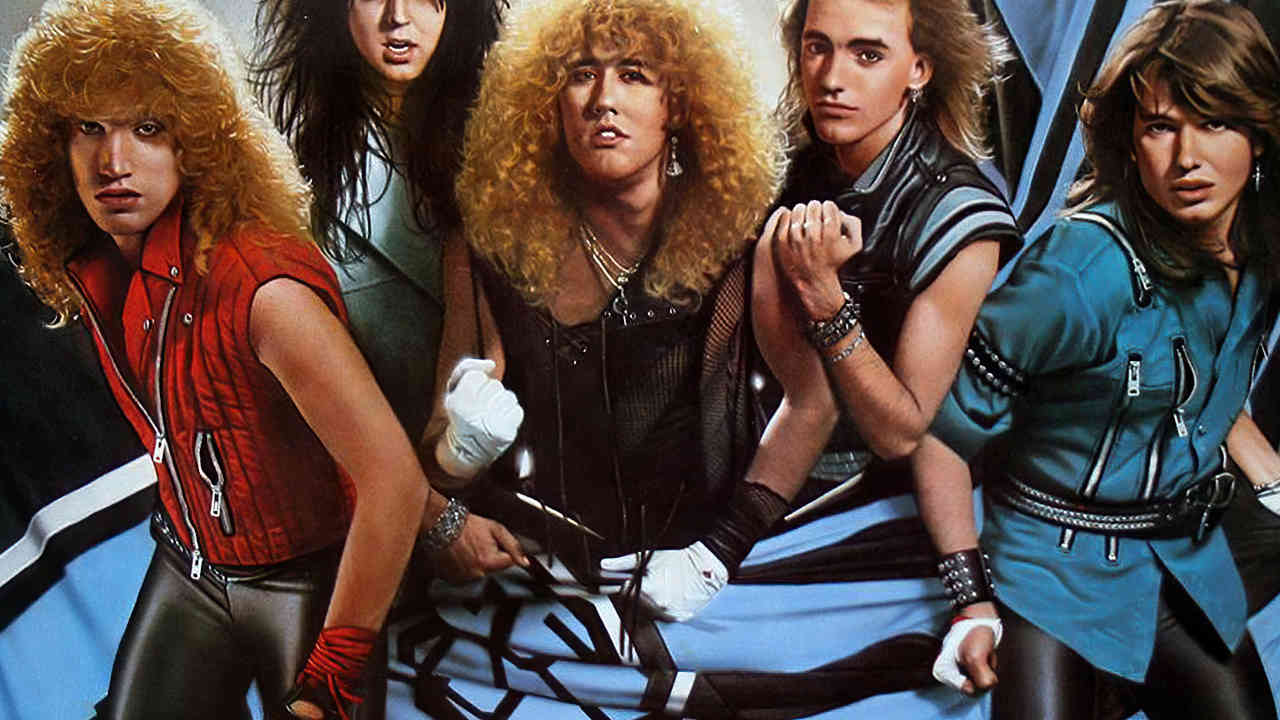
It must seem like a lifetime ago that a young James Pond (soon to take the far more funky nom du rock Jaime St James) and a handful of school friends put together a college rock act named Movie Star. The band soon became a hit on the campus live circuit but, much like their moniker would suggest, the Portland, Oregon natives were soon coveting the bright lights of Los Angeles and preparing to take their first steps toward their dreams of rock’n’roll stardom.
“I was actually the drummer in that band,” St James recalls. “Tommy Thayer was on guitar and I think at some point Patrick Young came into the band [bassist Young joined as Movie Star evolved into Loved By Millions]. That was pre-Black ’N Blue. That was the band that set me and Tommy off.”
St James was, at this point, still a tub-thumper, not yet a singer. “I always sang when I was a drummer but I’d never stood out front; it never occurred to me. I was the drummer and I had to be back there. Anyway, some bar band was playing, and Tommy said: ‘You should go up and sing.’”
It would prove a turning point for St James. “After that everyone was telling me: ‘You should definitely be a frontman.’ People were saying I was the best frontman in Portland [laughs] and I guess it made sense. It was way easier finding a drummer than it was a frontman back then. Way easier.”
St James and Thayer knew exactly what they wanted to do next. Black ’N Blue were born. Featuring St James and Thayer plus Patrick Young, drummer Pete Holmes (“We used to race each other at track meets, I bet I can still beat him”) and their Movie Star bandmate, the delightfully named rhythm guitarist Virgil Ripper, the quintet hit the bars playing a mix of originals and AC/DC covers. Ripper then got cold feet.
“He wanted to quit the band,” says St James, “because he thought we were too heavy to get good paying gigs.”
With Ripper out of the way, the door was open for Jeff ‘Woop’ Warner. “I didn’t like his playing at the audition,” St James admits, “but Tommy insisted we give him a chance. Needless to say Jeff was a perfect fit.”
Not that Black ’N Blue were idle in promoting their debut album – far from it. Their American paymasters had their sights firmly fixed on the band’s home country, and the lucrative rock market in Japan.
“We did Japan and had a great time there. We did some strange stuff in central America… we did the US a bunch of times. We always got really decent tours in America,” St James says. “I mean, that first record saw us tour with Aerosmith for a ton of shows, we did Dio, we did Kiss… We did a lot of dates.”
By second record, 1985’s Without Love, hard rock had established a firm foothold in the US charts, with bands like Quiet Riot, Mötley Crüe, Ratt and Night Ranger enjoying success, but it was merely the tip of the iceberg. In August 1986 (and a month later in the UK), Bon Jovi would release the album that made their careers. Slippery When Wet would turn the New Jersey quintet from also-rans to world beaters, selling almost 30 million copies. The reason it’s mentioned here? Simple: without Black ’N Blue, Slippery When Wet might not have existed, at least not as we know it. As the story goes, Jon Bon Jovi was looking to hire a producer for the follow-up to 7800° Fahrenheit when he heard Without Love and was completely blown away by it, hiring Bruce Fairbairn (and writing a song of his own called Without Love).
“I can verify that,” nods St James, “as Jon Bon Jovi told me that face to face one night. So it’s true! What he told me was: ‘I put your CD on and it blew away ours.’ Even Richie Sambora thanked me. I don’t know, I guess it should kinda piss me off in a way. Like, you know, where’s my cheque?”
St James isn’t bitter, though. “What I can take away from it is, I must have been a fairly smart guy for choosing [producers] Bruce Fairbairn and Bob Rock. I saw something there.”
While Slippery When Wet went on to to make global stars of Bon Jovi, Without Love sank without a trace (it’s the only Black ’N Blue studio album not to chart) and is considered by some fans as the band’s worst record. St James sees both sides, though.
“I liked that record and, yes, it was a departure from the first one. Without Love cost, like, $300,000 to make, something like that… A decent chunk of money. And obviously the label was on at us to get something, some kind of hit single out of the thing. And I don’t blame them, I think we did a pretty cool record there.”
The closest they came to the elusive hit single from the album was with Nature Of The Beach. The song featured on the soundtrack to 1985 motion picture Vision Quest, and additionally somehow ended up as the B-side to Madonna’s Gambler, a single released from the soundtrack. “I have no idea how that happened,” St James laughs.
Album No.3 saw the band enlist the services of Gene Simmons. The Demon had formed a strong bond with the band, after they had opened for Kiss early in their careers. “We asked Gene to get involved. It was kinda my idea actually,” St James says. “When we were touring with Kiss, we went up to Gene’s dressing room and we were like: ‘You know, we’d like you to produce this record.’”
With Simmons on board, the band entered the studio with a desire to get away from what they felt was the overtly commercial sound of Without Love and to return to what St James describes as “the toughness” of the debut. St James also admits: “I wanted a producer who was going to be on the band’s side, not the record company’s side. I thought that was the only way we’d get the sound we wanted.”
The resulting album, 1986’s Nasty Nasty, lived up to its title, with the band pushing the guitars up in the mix. It features some genuine Black ’N Blue classics; 12 O’Clock High, Kiss Of Death and the title track itself are all fine examples of what made the Portland quintet special. One track, though – I’ll Be There For You, penned by Jonathan Cain, the Journey keyboard player who co-wrote Don’t Stop Believin’ – stands out, and for all the wrong reasons.
“It’s funny, you know – it wasn’t even supposed to be on the record,” says St James. “We did it for a movie soundtrack. After we were done recording that album with Gene, John Kalodner hooked us up with Jonathan Cain and said: ‘I want you guys to get a song on this movie soundtrack.’ So we went into the studio again, completely separate to the album, to cut that track. But once Geffen heard it, they were like: ‘Fuck it, that’s going on the record.’ We were taken by surprise, I have to admit. But they insisted, ‘That’s the single, it’s going on.’”
But to the band’s mind, adding the track at the last minute seemed like a crazy move. St James goes on to say: “It didn’t seem to fit the record really, it wasn’t part of the ‘scheme’ we had.” Although he concedes: “It’s a good song, I like it but I can understand why some people didn’t because it kinda seems like it was out of place. Nasty Nasty was a record we were trying to get back to the toughness, and then that track is like: ‘Oh, okay.’ It might have been better suited to the Without Love record.”

Despite their lack of commercial success at this point – Nasty Nasty turned out to be their highest-charting record, reaching No.110 on the Billboard listings – Geffen remained loyal to the band, a fact that St James acknowledges to this day.
“Geffen definitely took care of us. As far as recording budgets go, they got us some pretty big name guys to work with. They went all-out on that, so I can’t complain about them too much.”
But recording budgets aside, Black ’N Blue always saw themselves as a kick-ass live act – something Geffen never fully bought into, it seems.
“Yes, it’s true to say that as far as tour support and all that, well, I don’t know…” St James responds. “Tour support was minimal. I mean, we always had our bus and stuff like that, but they were always more focused on looking after the records.”
With Gene Simmons at the helm once again, Black ’N Blue returned to the studio to record what would become 1988’s poorly received In Heat. But the album was far from the total wash-out some critics would have you believe. Indeed, In Heat includes some bona fide classics, like Heat It Up! Burn It Out!, Great Guns Of Fire and Get Wise To The Rise, prime cuts all. But the album does feature “some strange moments,” as St James admits. It didn’t fare well, reaching No.133 on the Billboard charts. Sensing a change in the wind, Black ’N Blue broke up.
The band reunited sporadically over the next two decades, though it wasn’t until 2011 that they finally put out a new album, Hell Yeah. It would have come out sooner, were it not for a run of obstacles: the studio they were recording in went bust, there were problems with their label and, more happily, St James was briefly enlisted to replace Jani Lane in Warrant and Tommy Thayer was permanently enlisted by Kiss to replace Ace Frehley.
“I think there’s a lot of bands that, after this much time has gone by – and remember we haven’t done a studio record since ’88 – would sometimes just come out with a pile of crap,” says St James. “You know, just make a ‘by numbers’ record. We obviously didn’t want to be one of those bands, which is another reason why it took so long to make this album. We wanted to make a great record, and I think we came through.”
Since then, the band have become a fixture on the cruise ship and US rock festival circuit, though they’ve yet to release a new album. Still Jamie St James remains proud of the music they have put out over the years.
“We were always decent songwriters, I think,” he says. “I mean all our records have some great songs on them, sure there are some strange moments too, but what I think keeps people coming back to Black ’N Blue is the songs.”
Originally published in Classic Rock Presents AOR issue 3







